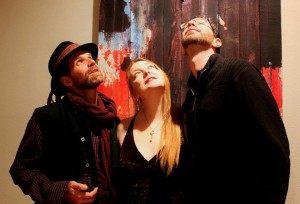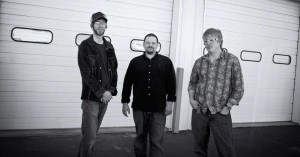Tags
Related Posts
Share This
Trio Andaluz/Kodama Trio Show on Campus
SFUAD will be hosting bands, Kodama Trio and Trio Andaluz this weekend for a CD release and show. Jeremy Bleich, a contributing faculty member for the Contemporary Music Department, has his hands in both bands as he writes, produces and plays in the groups.

Trio Andaluz: From right Gregory Gutin, center Meagan Chandler, left Jeremy Bleich
Trio Andaluz was established in 2006 and includes Bleich playing oud, keys and guitar, vocalist Megyn Chandler, instrumentalist Gregory Gutin and vocalists Rabia and Benjamin van Hattum, all with their own experience in world musics. Their latest album, Sights Unseen, delves into some quarter-tonal scales, asymmetrical rhythms, meter-changes and is created with mix of Arabic, North African, and European instruments.
“A number of these pieces you can hear that Arabic influence,” says Bleich, “but it sounds poppy too. The first piece, “Constant Conversation,” I wrote when I was in Turkey in Konya, which is where Rumi is from. When we came back, it was clear we wanted to use a Rumi poem, but it became like a pop tune really, like a pretty pop tune written on an oud.”
The use of these instruments was carefully distinguished by Bleich as more than simply the sounds they create.
“It’s interesting because the idea of fusion, it’s very relative. It’s an interesting term,” says Bleich. “I think that for [Trio Andaluz] it’s less about the instrumentation, and more about fusing vehicles, the rhythmic vehicle of eastern music, the Makam, which are the scales, and the song sensibility and the lyrical songwriting of western music.”
He goes on to describe Trio Andaluz as a group that sits in the crease between the Persian tradition of the music moving linearly with a less harmonically dense sound, allowing for a improversation and meandering melodic lines and on the tradition of western music to move more vertically in dynamics and structure.
“We tend to improvise in a way that’s kind of more like spontaneous composition than it is like, kind of searching. So I’ll start, I’ll play a line that will be kind of composed in my head. When I lead an improvisation, I’ll have a sort of A-section in my head, then maybe a B-section will come after that, then I’ll repeat phrases to make it a little more structural,” says Bleich.
This sort of fusion, or middle-groundedness of the group is something Bleich hopes to maintain, without pushing too far in either direction.
“I think one of the things that’s really important to me,” he says, “is the idea of not trying to do something that’s been done and also not trying to throw myself into the world of Arabic music. I mean I hear those guys, I know some of those guys, I’m not gonna try to be one of those guys. It’s not my tongue to speak with.”

Kodama Trio, left Jeremy Bleich, center Milton Villarubia III, right Robert Muller
“Kodama Trio,” Bleich says, “is a completely different story.” Bleich plays electric bass, Milton Villarrubia III is on drums and, another CMP faculty member, Robert Muller plays piano.
“It’s a Jazz piano trio, and it’s definitely on the more modern experimental side of things. We’re not playing standards. We’re not trying to sound like, you know, bebop music,” says Bleich.
The self-titled album definitely demonstrates this as it is quick, without a sense of swing. It is deeply rhythmic, wrought with meter-changes, and an improvisational posture; the bass and piano at times melodically butting in dialogue with one another.
“I would say the influence and structure of this trio really starts, the earliest thing you could trace it back to would be like the 60s, you know, where people were really trying to explore,” says Bleich. “There’s one piece on here that’s called Portrait and Reflections which is really an homage to Scott LeFaro and Bill Evans, which is kind of like the first piano trio that I felt started to really get out of the normal thing.”
The second track, “Milespost 22,” written by Muller, is an homage as well about the musical experience Miles Davis was giving him at the time; a kind of commenting on the classic jazz quintet.
“These compositions were created mostly in the mid-90’s,” says Bleich. “And they were kind of a walking out the door of jazz music, in a sense. The last piece that I wrote in the chronology here was a tune called “Sojourn”, which I wrote right before my group Birth took off and I went totally into the free thing, you know, electronic stuff. So, it’s kind of got this Americana flavor to it. I think of it as a kind of symbol of me walking out of the jazz house and I didn’t get back into it too much until I found these guys here in Santa Fe.”
The group is one that is working hard to redefine jazz, hoping to allow the definition to expand to include modern players.
“It’s hard to play jazz music in a lot of ways because people have a lot of very specific ideas about what jazz music is; it’s become a really set structure,” says Bleich. “And that doesn’t interest me. I’m more interested in where jazz is now than where it was when I was born….You won’t hear us playing a Charlie Parker tune. You’ll hear us playing a Jimi Hendrix tune.”
The group is a place for Bleich where he, and his fellow players, are free to delve into the style. In contrast to Trio Anduluz, Kodama Trio is Bleich’s tongue to speak with.
“In Kodama Trio,” says Bleich, “we have a kind of virtuosity in our playing because, you know, this is our home. It can reach very high levels in terms of its interaction and communication and what we’re hearing and things like that. It’s a pretty amazing experience when things get cooking, which is what jazz music should be.”
The CD release show is on Saturday, March 26 at 7:30 with a $10 admission, $15 with one CD, $20 with both CDs. Admission is free to SFUAD students.






 Jackalope Magazine is the student magazine of Santa Fe University of Art and Design. Building on the interdisciplinary nature of our education, we aim to showcase the talent of our university and character of our city.
Jackalope Magazine is the student magazine of Santa Fe University of Art and Design. Building on the interdisciplinary nature of our education, we aim to showcase the talent of our university and character of our city.
Recent Comments